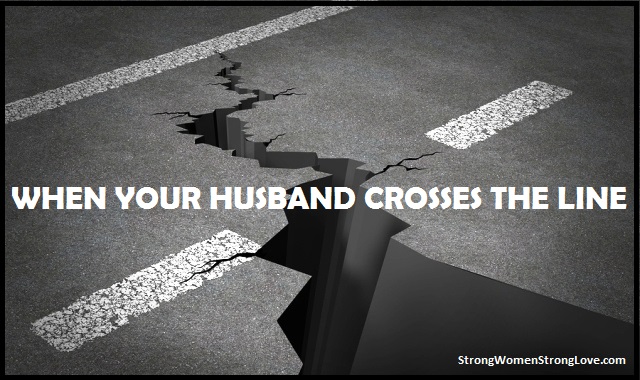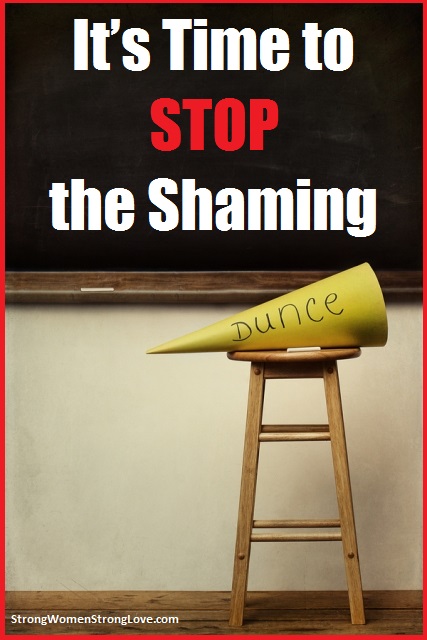by Strong Women Strong Love | Feb 15, 2016 | Poisonous Patterns |

Uh-oh. It’s happened. Your husband has crossed one of the non-negotiable lines with you. He’s shown disrespect in a way you just won’t tolerate, whether that’s cursing at you, raising his voice in public, or another boundary-pushing behavior.
What do you do now?
Your first instinct when your husband crosses the line might be to strike back or run off. If you can, don’t do either one of these things. Try a more measured approach that is actually more effective in the moment and better for your relationship in the long term:
- Express your boundary calmly and clearly.
- Let him know you expect him to do better.
- Move on.
Before you do anything, take a deep breath and see if you can get calm and clear headed. Otherwise, your message won’t be as powerful.
When you’re ready, look your husband in the eye and let him know that the behavior he’s engaging in is one you absolutely will not tolerate: “Cursing at me under any circumstances is completely unacceptable. I would never do that to you.” Things will probably be a little intense during this initial confrontation because you are drawing a crystal clear boundary. Be calm, firm, and clear.
Next, set a positive expectation. Tell your husband that you expect better from him. You may want to say something like “I know you are better than that” or “That wasn’t the guy I married.” Choose words that work for your situation and your relationship, but hold open the possibility that he can be more respectful.
Then, move on, and give him some space. You want to be short, sweet, and to the point. Lengthy explanations usually just confuse the issue.
With a little time and space to reflect, most men will eventually feel sorry for crossing the line. If your husband sincerely apologizes, forgive him, but keep a watchful eye until you’re convinced he will not cross the boundary again.
If your husband shows no remorse about crossing the line, or worse, acts self-righteous about it, you may have a bigger problem on your hands. Although we are talking here about actions that go beyond everyday slip-ups, more dire and complex behaviors like addiction and physical or emotional abuse are good reasons for seeking professional assistance.
If you tend to fear conflict, all of this can be a little scary to undertake — even though you know in your gut that it’s the right thing to do. It may help to remember that taking a stand is ultimately the best thing for your relationship and for establishing the baseline for respect. Disrespect is something that simply cannot take root in your relationship if you want it to remain healthy. Research clearly shows that contempt is the No. 1 predictor of divorce.
A firm, clear and quick response can help keep problems from escalating when your husband crosses a line. You can learn more about constructive ways to argue or deal with trouble spots in your relationship in my book Strong Women, Strong Love.
Don’t forget to subscribe to receive new blog posts HERE and get a free report, “10 Easy Ways to Get Him to Listen.”
by Strong Women Strong Love | May 15, 2015 | In the News, Poisonous Patterns |

Shame is having a moment right now.
You’ve probably seen posts in your social media feeds about parents shaming their misbehaving kids or cheating spouses being publicly shamed. Even dogs are getting shamed for their misdeeds!
I admit it: Those dog-shaming posts do crack me up. But otherwise this trend toward shaming is a cruel one that’s dangerous to our relationships.
It doesn’t take a viral social media post to hurt someone with shame, either. Have you ever criticized your husband while the two of you were with your kids, with friends and family or out in public?
Why Shame Hurts
Shame erodes the very things that are essential to the health of your marriage. Relationships need respect to thrive. Dr. John Gottman has done extensive research on what leads marriages to fail. He identified what he calls “the Four Horsemen of the Apocalypse” in marriage. Shaming summons two of the Horsemen: criticism and contempt. Contempt, which is at the heart of shaming, is Gottman’s No. 1 predictor of divorce.
When you shame your spouse, you are robbing him of his dignity and taking away his sense of safety in the marriage. A shamed person feels rejected, which is profoundly painful to us as humans — it even activates the same parts of our brains that get triggered when we feel physical pain.
Make it a priority to preserve dignity and respect in your relationship. Distinguish private conversations from public ones. As you keep shaming out of your marriage, I also want to encourage you not to share or like social media posts that shame others. If you haven’t already, watch the powerful TED Talk by Monica Lewinsky (someone who knows firsthand the pain of shaming) about our “culture of humiliation.” Is that really the kind of culture we want to participate in creating? Take a stand against it by communicating with empathy and respect, both in your marriage and online.
by Strong Women Strong Love | Feb 17, 2015 | Passionate Partnership, Quotes |

My Valentine’s Day blog gave tips about firing up the passion in your relationship. This week, I want to talk about something a little less romantic but perhaps even more important: the connection between respect and love.
Just as we want the passion to continue in our relationships, we want the loving feelings, caring and sweetness to go on, as well. Too often we assume that these things take care of themselves. But just like passion, emotional intimacy needs maintenance in your relationship.
And the way to maintain a loving atmosphere in your marriage is to maintain a respectful atmosphere.
In my book, Strong Women, Strong Love, I note that respect is, in many ways, even more important than love in your relationship. Respect is the very soil from which true love sprouts.
In long-term relationships, it’s quite normal for feelings of love and passion to wax and wane over time. If partners have maintained a deep respect for each other, in time, these feelings can be rekindled. However, when there is a serious breakdown of respect, relationships inevitably end up deeply troubled.
Respect in a relationship can be lost unintentionally if we’re not being mindful of it. It’s all too easy to shift into “autopilot” with our spouses and slip into disrespect over time. We get so used to having each other around that sometimes we don’t truly “see” the other person any longer, and we don’t think about the impact of our words and actions. We might end up talking to our spouse without the same common courtesy we’d show a neighbor or colleague. How would your co-workers react if you rarely listened and talked to them mainly to point out what they weren’t doing or what they were doing badly? Your marriage can’t thrive that way, either.
Rebuilding Respect
If you’re ready to strengthen the respect in your marriage so that love can flourish, here are a few fundamentals:
- Respect means valuing and holding each other in high regard. You can still express your needs and even argue, but you can’t attack your spouse’s dignity if you want your marriage to last.
- Respect creates feelings of safety and trust in a relationship. It doesn’t matter how clearly you communicate, you’ll never achieve deep emotional intimacy if you say hurtful things when you express your true thoughts and feelings. When there is respect, it’s much easier to get emotionally closer, so don’t be brutally honest.
- Respect is also about accepting your natural differences. The fact that the two of you are different is not a problem, unless you devalue each other based on those differences. For example, maybe your husband doesn’t emotionally disclose as readily as you do. If you think you’re a better human being because you’re more in touch with your feelings, that’s a disrespectful stance that can hurt your marriage.
- Respect is a verb. Show respect and love regularly through your words and actions.
- Respect and contempt can’t co-exist. According to the Gottman Institute, contempt is the No. 1 predictor of divorce. Treating each other with disrespect will eventually destroy your relationship.
- Respect for yourself is as essential as respect for your partner.
I write much more about the relationship between respect and love in my book Strong Women, Strong Love. This week, look for ways to build respect in your marriage, whether that means choosing your words more carefully when you want your husband to do something around the house, or exercising your own self-respect by setting boundaries on disrespectful behavior.
Aretha Franklin was right: It really all does come down to R-E-S-P-E-C-T.




